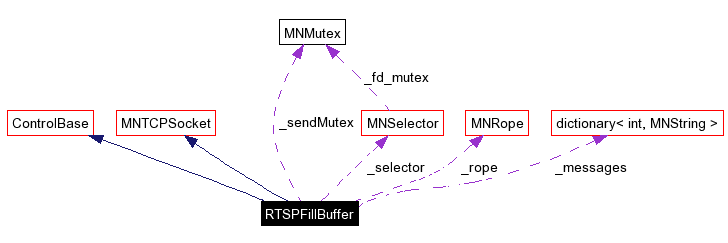
#include <RTSPFillBuffer.h>
Inheritance diagram for RTSPFillBuffer:


Public Member Functions | |
| RTSPFillBuffer (MNSelector &slct) | |
| RTSPFillBuffer (MNSelector &slct, int fd) | |
| virtual | ~RTSPFillBuffer () |
| virtual MNTCPSocket::Fail | connect (int port, const char *hostname) |
| void | setConnectFailIsFatal () |
| virtual void | callback (MNSelector *slct, int fd) |
| void | reader () |
| virtual void | receiveIt (uchar_t *buffer, int bufsz, int fd) |
| virtual void | MsgOut (int errNo, const MNString &headers, const MNString &body, int seq) |
| virtual void | MsgOut (const MNString &text, int seq) |
| virtual void | MsgOut (const MNString &text) |
| virtual void | MsgOutNoEOL (const MNString &text) |
| void | MsgOut (MNString text, int seq, MNString body) |
| int | MsgOut2LibServer (MNString text) |
| void | CreateCSeqAnswer (MNString &Answer, int seq) |
| virtual MNString | getClientHostname () |
| virtual MNString | getMulticastAddress () |
| MNString | Rope2MNString (MNRope &rope) |
| MNString | getLastHeaderString () |
| MNString | getLastSDPString () |
| void | deleteHeaderLine (MNString, MNString, MNString &, MNString &) |
| virtual int | getNextCSeq () |
| void | setBandwidth (int bw) |
| int | getBandwidth () const |
|
|
|
|
||||||||||||
|
|
|
|
|
|
||||||||||||
|
Implements MNTCPSocket.
|
|
||||||||||||
|
This function calls MNTCPSocket::connect, which in turn calls ::connect. It is obviously meant for use with the constructor that is not passed a connected socket. In addition to the MNTCPSocket function, this function changes the socket mode to non-blocking after a successful connect. Reimplemented from MNTCPSocket.
|
|
||||||||||||
|
|
|
||||||||||||||||||||
|
|
|
|
Reimplemented from ControlBase.
|
|
|
Implements ControlBase.
|
|
|
|
|
|
|
|
|
Implements ControlBase.
|
|
|
In a perfect API, the send functions should be able to insert the CSeq into RTSP messages without the caller asking for this information first. It seems that this is problematic somewhere in the code. Implements ControlBase.
|
|
||||||||||||||||
|
|
|
|
This version of MsgOut takes the "text", adds a CRLF and sends it. Implements ControlBase.
|
|
||||||||||||
|
This version of MsgOut takes the String "text", adds a CRLF, and sends it. Implements ControlBase.
|
|
||||||||||||||||||||
|
This version of Msgout creates a complete RESPONSE MESSAGE and sends it. Implements ControlBase.
|
|
|
|
|
|
This version of MsgOut takes the String "text", and rawly sends it. Implements ControlBase.
|
|
|
|
|
||||||||||||||||
|
This functions is called when data is received from a socket. If the data looks like a complete data block, the various parsers are called, command objects are created and their call() function is called.
|
|
|
|
|
|
Reimplemented from ControlBase.
|
|
|
|
 1.3.8
1.3.8